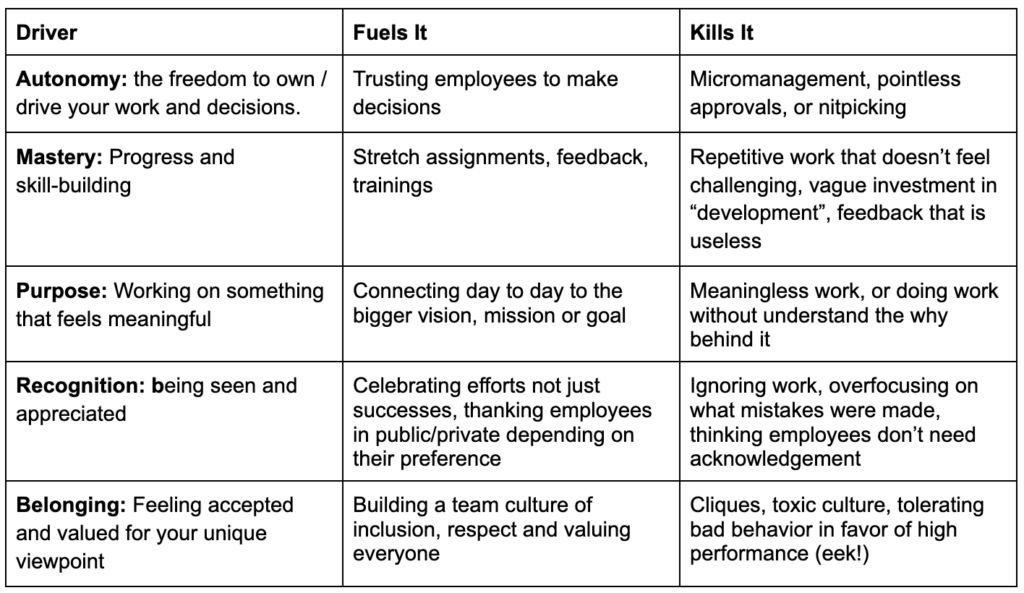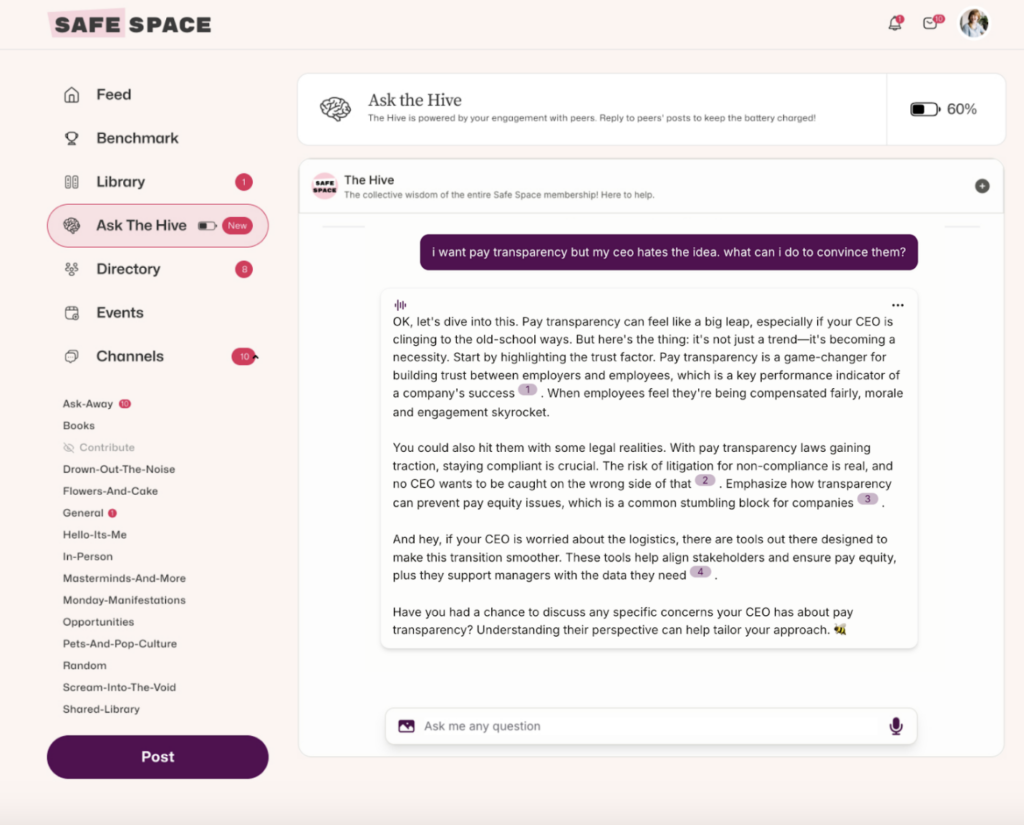Motivating Employees

🙋🏽♀️ Question: do you think your manager understands what motivates you?
🙋🏽♀️🙋🏽♀️ Follow up question: do you think the managers in your organization know what motivates their teams?
I would hope the answer to both of those questions is a resounding YES.
But the reality is… most managers might not actually know…
It could be because managers are overwhelmed with work and key parts of their jobs like feedback, motivation, and leadership aren’t skills that are taught or come naturally to most! Yes, you’ve heard me rant about how we need to dramatically rethink the role of managers.
It’s in that spirit I wrote this newsletter – I want to help your managers better understand their teams and what motivates them.
Why?
Because motivation drives soooo much at work from engagement to productivity once you learn someone’s motivations A LOT can be unlocked.
And so much of our role in HR is to support employees doing their best work.
Not to mention the whole theme of this quarter – employees just want _____ – well employees just want to be motivated. Right?? Right!!!
Before we get to how managers can actually figure this all out, let’s start with understanding motivation more broadly.
There are two sides to motivation:
- Emotional drivers: what makes someone feel fulfilled
- Practical drivers: tangible things that make someone want to stay and work harder
I was dire to understand if my hunches were correct about what would be the most popular motivator in each category so last week I asked y’all to take a quick survey to share your thoughts. Shoutout to the over 800+ people who shared their thoughts. I’d never deprive you of the data, so below you’ll see how the survey results.
Let’s look at each emotional drivers vs practical drivers.
Emotional drivers:

Emotional drivers = high level / human core stuff.
These are important to understand because they are much deeper than the practical drivers. The emotional drivers could tell you a lot about what the person values.
JOIN 150K+ HR LEADERS
Get insights, learnings, and advice on how to build companies and cultures that people actually love.
No spam. Unsubscribe any time.
On a behavioral level, I broke each driver into what can fuel it or kill it. Managers may have behaviors that are killing motivation without even realizing it…

I am someone who would consider herself motivated by autonomy. Nothing kills my innovation or spirit faster than a manager who micromanages. In fact, one of my jobs that I HATED the most featured a manager who had to approve every single thing I did. I’ll let you guess what my engagement was like at that job…. But I’m also torn because I feel like purpose is super high for me!!
Now, when it came to our survey responders you can see – some of them felt the same way. Purpose and autonomy were the majority!! For an audience of mostly HR people it makes sense right??
We SEE the impacts of our work, even when employees don’t quite see it. Our work can make a difference in someone’s life. And one of our biggest issues is securing the buy-in of our execs and maybe that’s why autonomy is ranked so high?
✍🏽 A lot of folks wrote in with comments about the survey but this particular comment really stuck out to me and I deeply appreciated the writer sharing! I love the call out that the emotional & practical drivers have to be aligned or else motivation still suffers AND you have to do the work on yourself to understand your motivations.
Manager pro-tip: you can’t figure out someone else’s motivations if you don’t know yours!
Read what they had to say:
“I left a job in which I had great internal motivation: autonomy and purpose; I was proactive in mastering new skills and developing my team. The external motivation killer for me was that my supervisor lacked curiosity, self-awareness, and emotional intelligence, which resulted in me having to schedule my own quarterly meeting with him, telling him about my career pivot idea from operations to HR to which he never followed back up with me until I gave my two weeks notice. In one of my performance reviews, he delayed in scheduling because he was afraid to tell me feedback in which I was talking too much and intimidating other people in their roles because of the go-getter I am. (yes, I know I talk too much and is something I am always working on since I was 4 years old), I congratulated him on actually saying the hard thing. Now, I am in a job where my supervisor consistently asks me how I am doing and what he can do for me (on a weekly/bi-weekly basis) and actually listens. It’s huge external motivation factor that I was missing.
When we get frustrated at work, we need to take a beat and reflect on the bigger issue. What’s actually going on? What is triggering us? What motivation is being forgotten? It’s OUR work to do on ourselves and up to us to be clear on what motivates us and informing our supervisors (managers day-to-day) how we can be supported, what’s important to us, what values are important to us. THEY ARE NOT MIND READERS!! And ask them to check-in with us and on us to check in with them. That’s one of the biggest lessons I learned.”
Practical drivers:

Practical drivers = the more tangible stuff.
I cannot talk about motivation without talking about the practical stuff. Yes, emotional drivers are super important but practical drivers are the things that show up *the most* when it comes to employee feedback.
Why? Because it’s the stuff you intimately FEEL.
Like:
- Compensation
- Flexibility
- Career advancement
- Recognition*
- High-Impact work
*Recognition twice! What am I doing?? It’s so important I had to say it twice!! Recognition is a deeper emotional need AND tangible.
The survey responses to this question weren’t surprising. Compensation coming in at NO.1 is to be expected. I would NEVER judge someone for putting compensation at NO.1 and people who would need to examine their life. Life is expensive and we’re not working for fun!
What I was surprised to see was how close flexibility was to compensation. But if you think about it with all the RTO mandates folks are craving that flexibility more than ever. And you know I’m a mega huge fan of flexibility.
✍🏽 Let’s look at what folks wrote in the survey:
“One thing that I often hear is that there are many elements to motivation, but without financial incentives all the other motivators (e.g., praise, prof dev opps, perks, etc.) can only take you so far. And, from what I experience in my position and hear from other HR colleagues is that salary is absolutely stagnating and whereas maybe 10 years ago an employee could expect steady financial growth that felt meaningful, since the pandemic and through today, compensation feels insufficiently connected to an employee’s effort.”
Ooof I felt this so much in my soul. Loading an upcoming newsletter about this…
“Higher compensation is a close second on practical rewards. In my opinion the most ideal practical reward is a comprehensive compensation package that includes competitive pay AND generous flexibility and benefits programs.”
PREACH!!
“It was hard picking one thing that motivates me. I guess, like most things in life, it is not black and white.”
And finally this… I heard a lot that it was a hard survey to take because I made folks pick ONE in each category. For everyone who wrote in and told me to let you stack rank them… I hear you and will try that in the future.
How managers can figure it all out:

We’ve dug in emotional vs practical motivators but how can managers figure this all out?
📣 Let me tell ya, it’s not by asking a loaded question like, “what motivates you?” That question is way too vague and most folks won’t know how to answer.
Here are 3 things managers can do to unlock their team’s motivations.
1. Ask better questions. What motivates you is out, here are better questions to ask:
- When do you feel the most energized during the week?
- What kind of work makes you lose track of time?
- What’s something you’d love to do more of here?
- What would make you even more excited to show up every day?
- What type of recognition do you prefer, public or private?
- How else can I support you?
- What do you need more of or less of?
If managers could sprinkle these into 1:1 convos they would learn more about what the employees preferences are.
If your managers are struggling to get employees to open up another tactic is to ask your team to write down at the end of the week and share:
- What brought me joy
- What drained me
Don’t forget: you can ask these questions at different milestones and get different answers. Motivation isn’t a static concept – it will ebb and flow just as an employee’s journey will!
🧙🏾♂️Unlocking motivation is a lifelong quest of any manager.
2. Observe behaviors. Being a good manager means being observant. So much can be learned through simple observation.
Managers should watch out for things like:
- Who enjoys working with little management? (autonomy)
- Who lights up during problem solving or strategy sessions? (mastery)
- Who volunteers for projects and stretch assignments? (mastery)
- Who is constantly shouting out their peers? (maybe they want the same for themseleves… recognition)
- Who values remote work balance? (flexibility)
- Who takes time to include everyone in the team? (belonging)
What’s that saying? Action speaks louder than words… behaviors will tell you about what people value without them having to say it!
3. Connect motivation to growth. Growth convos should not just be role focused, there’s so much more to uncover. Make sure managers are asking questions about things like:
- What skills do you want to develop in the next few months?
- What does progress look like for you right now?
- What would make you proud in the next 6 months?
- What type of impact do you want to have on this organization?
The more you can connect the daily work to the long term goals the more motivation can grow.
👀 Did you notice 2 out of my 3 tips involved managers simply making time for 1:1 convos and asking better questions? That is somewhat impossible if they are slammed with work and meetings.
You didn’t think I’d let you get through a newsletter without a SPECIFIC HR tip, did you???
HR Tip: Do an audit on your managers. What does that mean?
Try to understand:
- How long they’re spending in meetings
- How much work their team is responsible for
- What is the manager <> employee ratio
- At what cadence are they having 1:1 convos and growth convos? (BTW those are different)
Because at the end of the day… we all want better managers. Right?
What’s Next:

Next week – employees just want GOOD MANAGERS!!!
But what does that even mean!! Is it even possible?!!
Well, guess we’re going on an adventure next week!


